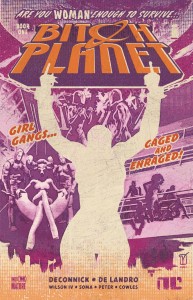 The historical role of feminism in science fiction is somewhat contested. On the one hand, common wisdom would have it that SF was a genre for white male writers at least until the late twentieth century. It’s true that male authors generally dominated science fiction during the early history of the genre, which stretches from the “scientific romances” and utopian narratives of the turn of the century to the pulp era of the early twentieth century to the midcentury “Golden Age.”
The historical role of feminism in science fiction is somewhat contested. On the one hand, common wisdom would have it that SF was a genre for white male writers at least until the late twentieth century. It’s true that male authors generally dominated science fiction during the early history of the genre, which stretches from the “scientific romances” and utopian narratives of the turn of the century to the pulp era of the early twentieth century to the midcentury “Golden Age.”
On the other hand, as many critics have pointed out, women writers played a significant role in the development of SF: Mary Wollstonecraft Shelley’s 1818 novel Frankenstein is often considered the first example of modern SF; women such as Gertrude Barrows Bennett, Mary Maude Wright, Clare Winger Harris, and Leslie F. Stone were important contributors to SF magazines; and Alice Mary Norton and Catherine Lucille Moore (who published as “Andre Norton” and “C.L. Moore,” respectively) are still regarded as monumental writers. Many of these writers explicitly treat gender roles, feminism, and sexuality; others are notable simply for being written by women and thus resisting an understanding of SF as an inherently masculine genre.
With the development of the “New Wave” SF in the 1960s and 1970s concurrently with women’s lib, feminist SF came to the forefront. The New Wave was formally and stylistically experimental and politically activated, tending toward “soft” rather than “hard” SF and including more diverse writers. During this period, writers such as Ursula K. Le Guin, Samuel R. Delany, James Tiptree, Jr. (Alice Bradley Sheldon), Joanna Russ, Suzy McKee Charnas, and Marge Piercy transformed SF into a rich venue for exploring feminist perspectives on gender, sexuality, and patriarchy.
Whether upending gender binaries, narrating utopian spaces of gender equality, or imagining separatist enclaves, these writers used the genre to forward feminist and queer consciousness. Since then, SF has become a popular venue for feminist narratives in work by major writers including Octavia Butler, Gwyneth Jones, Nancy Kress, Joan Slonczewski, Nalo Hopkinson, and Margaret Atwood (despite Atwood’s resistance to being categorized within the genre).
Indeed, since 1991, the James Tiptree Award has annually recognized outstanding works of SF that interrogate issues of gender. By provoking new critical perspectives on and imagining alternatives to society, SF continues to be a valuable tool for feminist thought.
